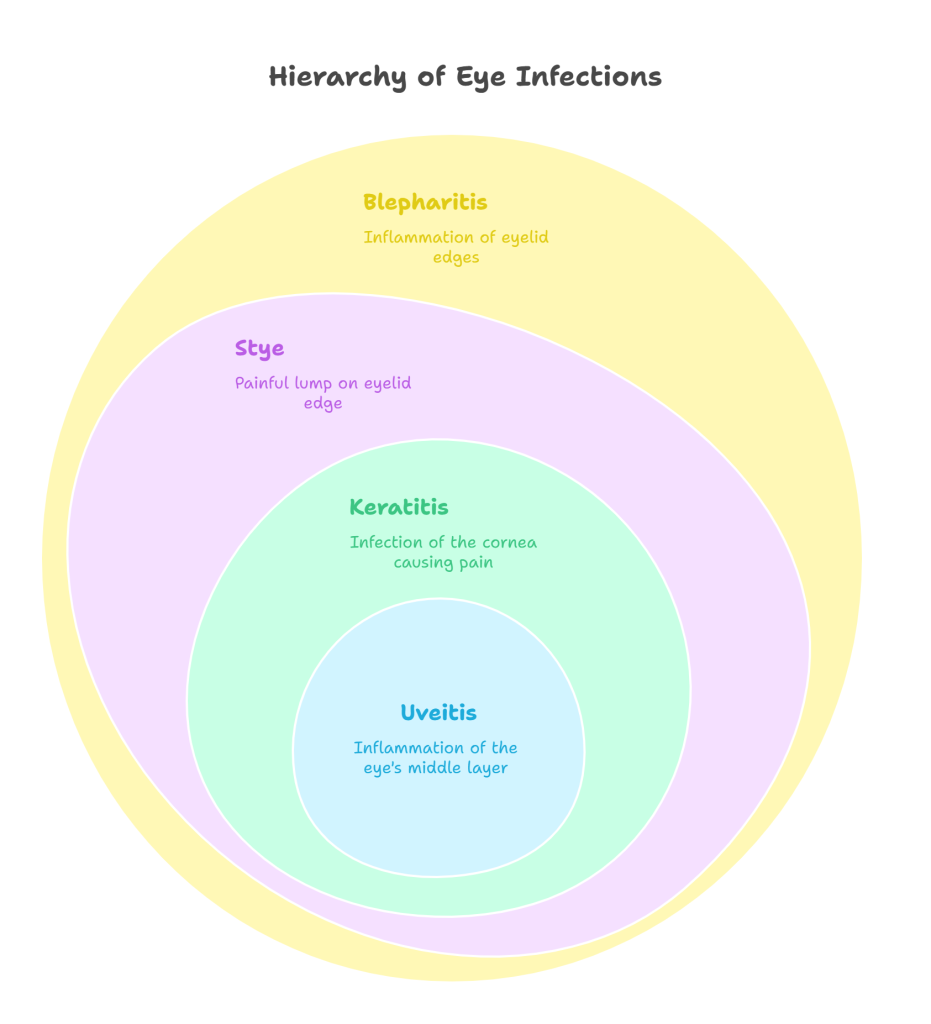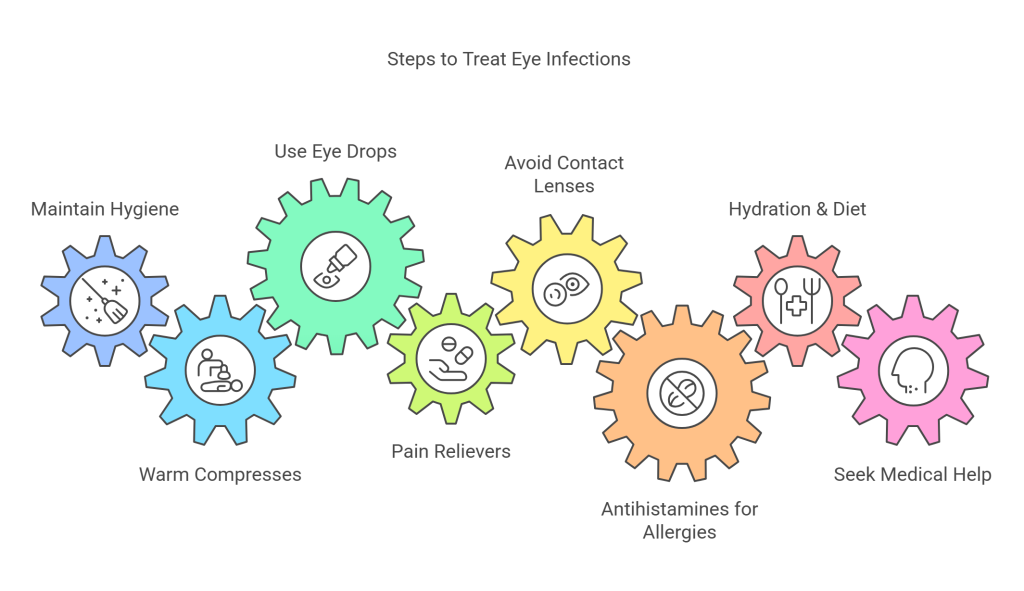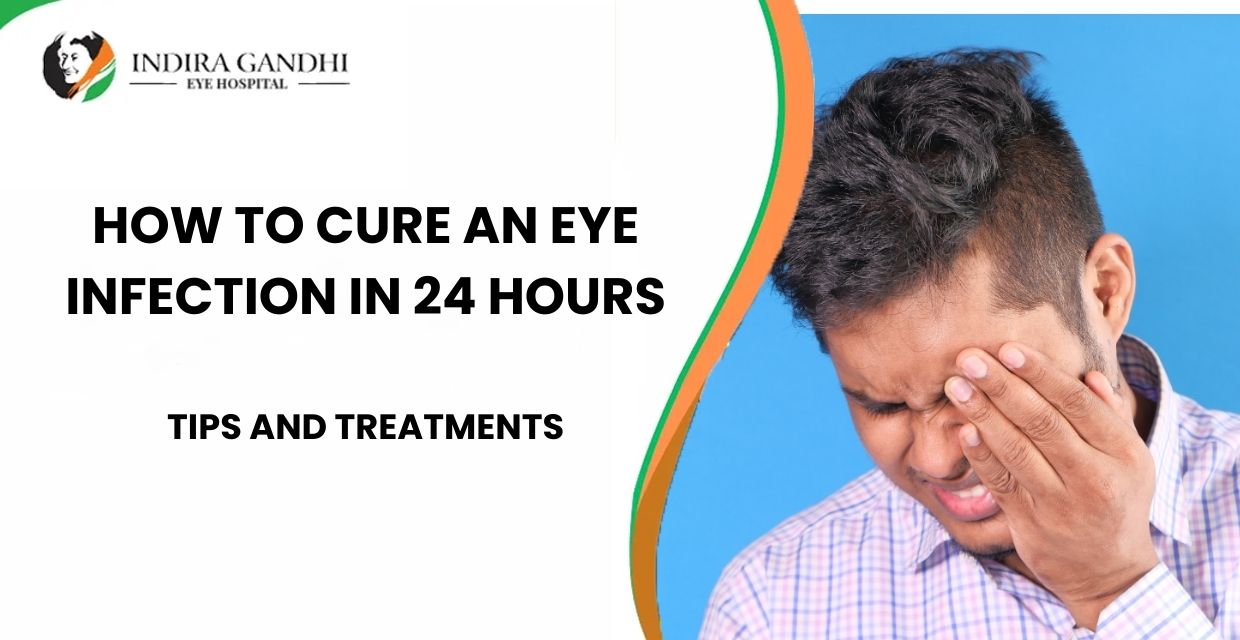|
Getting your Trinity Audio player ready...
|
Eye infections are not only uncomfortable but can also interfere with your day-to-day activities. Whether it’s a bacterial or viral infection, eye infections can cause irritation, redness, discharge, and even vision problems. If left untreated, they can lead to more serious issues. While many eye infections can take several days to fully heal, there are effective steps you can take to manage the infection and significantly improve symptoms within 24 hours.
At Indira Gandhi Eye Hospital, we understand the importance of maintaining good eye health and treating eye infections promptly. In this blog, we’ll guide you on how to treat an eye infection in 24 hours using simple yet effective methods. However, it’s crucial to remember that if the symptoms persist, worsen, or affect your vision, you should consult an eye care professional immediately.
Understanding Eye Infections

Before diving into the treatment, it’s important to understand the types of eye infections that commonly occur:
- Conjunctivitis (Pink Eye): This is the most common type of eye infection, causing redness, itching, swelling, and discharge from the eyes. It can be caused by viruses, bacteria, or allergens.
- Blepharitis: Blepharitis is an inflammation of the eyelid edges, often leading to discomfort, redness, and crusting around the eyelashes.
- Stye (Hordeolum): A stye is a painful lump that forms at the edge of the eyelid, caused by a bacterial infection in the hair follicles of the eyelash.
- Keratitis: This is an infection of the cornea, often due to bacteria, viruses, or fungi. It can cause blurred vision, sensitivity to light, and intense pain.
- Uveitis: Uveitis is inflammation of the middle layer of the eye and can be caused by infections or autoimmune conditions.
Now that we have an understanding of the types of eye infections, let’s explore the treatments that can help alleviate symptoms and speed up recovery within 24 hours.
Step-by-Step Guide to Treating an Eye Infection at Home

- Maintain Cleanliness and Hygiene
The first step in treating an eye infection is ensuring proper hygiene. Any infection can worsen if bacteria or dirt enters your eye. Keeping your eyes and hands clean is vital to prevent further irritation or spreading the infection.
- Wash your hands regularly with soap and water, especially before touching your eyes.
- Avoid rubbing your eyes as it can spread bacteria or worsen the infection.
- Clean your eyelids gently using a clean washcloth or cotton pad soaked in warm water.
If you wear makeup, discard contaminated makeup products and brushes to avoid reinfection. Also, avoid wearing contact lenses until your infection has completely healed, as they can irritate your eyes further.
- Use Warm Compresses
Applying a warm compress to the infected eye can help soothe irritation, reduce swelling, and promote faster healing. This simple and effective treatment works well for conditions like conjunctivitis and styes.
How to do it:
- Soak a clean cloth or cotton pad in warm water (make sure it’s not too hot).
- Place the cloth gently over the infected eye for about 5-10 minutes.
- Repeat this process several times throughout the day to reduce discomfort and inflammation.
Warm compresses can help ease the symptoms of styes, conjunctivitis, and blepharitis by promoting blood circulation to the affected area and loosening any crust or discharge.
- Use Eye Drops or Ointments
For most eye infections, using the right eye drops or ointments can significantly reduce discomfort and speed up the healing process.
- For bacterial infections (Conjunctivitis or Stye): Use antibiotic eye drops or ointments that are prescribed by your doctor. These will help kill the bacteria causing the infection and reduce swelling. Over-the-counter drops may also help soothe irritation.
- For viral infections (Conjunctivitis or Keratitis): Antiviral eye drops may be prescribed by your doctor to reduce the viral load in the eye and alleviate discomfort. However, remember that viral infections may take longer to resolve.
- For dryness or irritation: Use lubricating eye drops to keep the eye moist and reduce discomfort caused by dryness or allergies.
If you are unsure which eye drops to use, consult a doctor at Indira Gandhi Eye Hospital to ensure you’re using the right treatment for your infection.
- Take Over-the-Counter Pain Relievers
Eye infections can cause significant pain, especially when the infection is severe. Over-the-counter pain relievers like ibuprofen or acetaminophen can help reduce pain and inflammation. Be sure to follow the dosage instructions on the packaging, and consult your doctor if you’re unsure about the appropriate medication for your symptoms.
- Avoid Contact Lenses
If you wear contact lenses, it’s crucial to remove them immediately when you suspect an eye infection. Contact lenses can trap bacteria, dirt, and other harmful substances on the surface of your eyes, which can worsen the infection.
It’s best to avoid wearing contact lenses until the infection has cleared up. Consider switching to glasses during your recovery period to allow your eyes to heal without additional irritation.
- Use Antihistamines (If Allergic Reaction)
If your eye infection is caused by allergies (allergic conjunctivitis), antihistamine eye drops or oral antihistamines can help reduce itching, redness, and swelling. These medications can help alleviate the discomfort caused by allergens such as pollen, dust, or pet dander.
- Increase Your Water Intake
Drinking plenty of water can help keep your body hydrated, which is essential for healing. Staying hydrated also helps flush out toxins and bacteria from your system, supporting the recovery process. Aim to drink at least 8-10 glasses of water a day to keep your body and eyes well-hydrated.
- Eat Immune-Boosting Foods
A well-balanced diet rich in vitamins and minerals is essential for healing any infection. Include foods high in vitamin C (such as citrus fruits and berries), vitamin E (found in nuts, seeds, and leafy greens), and zinc (found in beans, nuts, and seeds) to boost your immune system and aid in recovery.
- Rest Your Eyes
Resting your eyes is crucial for healing an eye infection. Limit your screen time and avoid activities that require prolonged focus, such as reading or driving, as these can put additional strain on your eyes and prolong recovery.
Take short breaks every 20 minutes during screen time, following the 20-20-20 rule: Look at an object 20 feet away for 20 seconds every 20 minutes to reduce eye strain.
- Seek Medical Help if Symptoms Persist
While most eye infections can improve within 24 hours with proper care, some may require professional medical attention, especially if symptoms don’t improve or worsen. If you experience severe pain, blurry vision, excessive discharge, or sensitivity to light, it’s important to see an eye care specialist immediately.
At Indira Gandhi Eye Hospital, we offer comprehensive eye care, including the diagnosis and treatment of eye infections. Our experienced ophthalmologists can prescribe the appropriate treatment and provide expert care to ensure a fast recovery.
When to Consult a Doctor
While most minor eye infections improve with home remedies, certain symptoms require immediate medical attention:
- Severe eye pain
- Sensitivity to light
- Blurry or vision changes
- Large amounts of discharge or pus
- Redness that doesn’t improve after 24-48 hours
If you experience any of these symptoms, **contact Indira Gandhi Eye Hospital for a consultation. Early intervention can prevent further complications and ensure you receive the best possible care.
Fast Relief: Cure Your Eye Infection in Just 24 Hours!
Make An AppointmentConclusion
Eye infections can be a painful and uncomfortable experience, but with the right approach, you can cure or significantly alleviate the symptoms within 24 hours. By maintaining proper hygiene, using warm compresses, applying eye drops, resting your eyes, and taking over-the-counter medications, you can effectively treat common eye infections at home.
However, if your symptoms persist or worsen, always seek professional help. At Indira Gandhi Eye Hospital, we are committed to providing the best eye care for our patients. Our experienced team is ready to help you find relief and get your vision back to normal.
Don’t hesitate to contact us if you need personalized care or treatment options for eye infections. Your eye health matters, and we are here to support you every step of the way.












